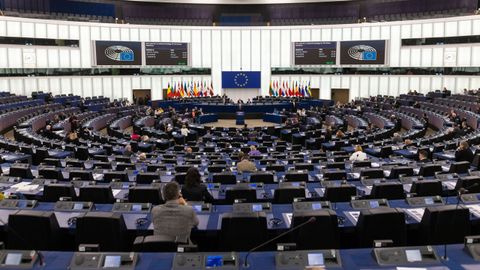
Author: DPA via Europa Press | EUROPAPRESS
Transactions with bitcoin or other virtual assets will be tracked just like traditional money transfers
The Eurochamber this Thursday gave the green light to the first European regulation on crypto assets. With 529 votes for, 29 against and 14 abstentions, plenary session European Parliament (PE) gave the green light for the introduction of a common legal framework that will be applied in all 27 EU countries.
The agency points out that this step is crucial for protecting consumers and preventing any type of crime, such as money laundering or market manipulation.
The law will make it possible to trace operations with cryptoassets in the same way as traditional money transfers, so that the origin of operations carried out with them can be traced. bitcoins or others tokens (coupons) of electronic money, except for the end user. All those transactions that are considered suspicious can be blocked, and all the information of that “trip” must be stored in case it is necessary to trace the data.
Which activities will be subject to this law? The European Parliament clarifies that the law will cover transactions over 1,000 euros from non-hosted wallets (private wallet addresses) to wallets or wallets hosted by trading houses or other platforms that provide services with crypto assets. However, the new rules will not apply to person-to-person transfers when they are carried out without the intermediary of the provider — they are impossible to trace — as well as those between providers acting on their own behalf.
The plenary session also approved new supervision rules, consumer protection and environmental guarantees and protection against market manipulation and financial crime.
All those companies that wish to issue and trade crypto-assets must comply with minimum requirements of transparency, information disclosure, authorization and undergo transaction monitoring. «Consumers will be better informed about the risks, costs and expenses associated with their business. In addition, the new legal framework supports market integrity and financial stability by regulating public offerings of crypto-assets,” explains the European Parliament.
In order to avoid the risks of money laundering and other frauds, the European Securities and Markets Authority (ESMA) you will need to create a public registry of crypto asset service providers which violate regulations and operate without authorization in the European Union (EU).
Those who are authorized to operate and have significant activity in this market must disclose the energy consumption generated by their activities, to reflect the high and growing carbon footprint created by mass mining.
“We are putting the EU at the forefront, with 10,000 different crypto assets. Consumers will be protected from deception and fraud, and the industry, badly damaged by the collapse of FTX, will be able to regain confidence. Consumers will have all the information they need and all fundamental risks related to crypto assets will be monitored,” said German MEP Stefan Berger on Thursday.
“Today, illicit flows of crypto-assets move rapidly around the world, with a high probability of never being detected. This law will obligate crypto asset service providers to detect and stop illegal activities and will also ensure that all categories of crypto businesses are subject to a full set of anti-money laundering obligations. This will close a major gap in our anti-money laundering legislation. and will implement the most ambitious regulations on transfers in the world so far, fully in line with international standards”, celebrated the co-rapporteur of the Committee on Economic and Monetary Affairs Ernest Urtasun.
When will it come into force? The text, around which there is already a consensus among all involved European institutions, must be officially approved by the Council — in which 27 EU countries are represented — and published in the Official Journal of the EU. The law will take effect 20 days after that happens.
Source: La Vozde Galicia
I am Jason Root, author with 24 Instant News. I specialize in the Economy section, and have been writing for this sector for the past three years. My work focuses on the latest economic developments around the world and how these developments impact businesses and people’s lives. I also write about current trends in economics, business strategies and investments.







